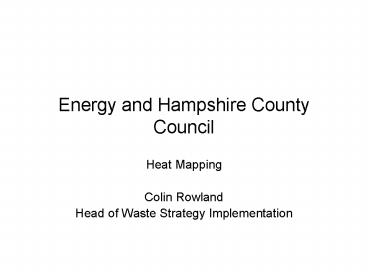Energy and Hampshire County Council - PowerPoint PPT Presentation
1 / 17
Title:
Energy and Hampshire County Council
Description:
The size of the icon indicates the intensity of the heat demand. Aggregated Data 1km sq. ... 40,001 50,000 kW. 10,001 20,000 kW. 100,001 999,000 kW ... – PowerPoint PPT presentation
Number of Views:65
Avg rating:3.0/5.0
Title: Energy and Hampshire County Council
1
Energy and Hampshire County Council
- Heat Mapping
- Colin Rowland
- Head of Waste Strategy Implementation
2
Energy and Hampshire County Council
- Context
- 2008 Energy Strategy Framework for PUSH
- baseline, forecasts and targets
- identification of policy development issues
associated with delivering reductions in carbon
emissions - 2009 Extend energy strategy framework to include
all of Hampshire
3
Decentralised energy opportunities?
- heat load by sector
Education 5
Other Industry 12
Housing 50
Large Industrial 19
4
Heat Mapping
- Database - current and future heat demand and
supply from industrial, commercial, and domestic
sources across the County. - Includes data on housing, industrial
installations, offices, retail establishments,
hotels, hospitals, government offices, schools,
leisure centres, Energy from Waste facilities,
and Combined Heat and Power facilities. - Model - capable of spatially representing
concentrations of heat load throughout Hampshire
to help inform planning decisions consistent with
the delivery of decentralised energy.
5
Hampshires Heatmap
6
How the model works
- GIS-based map consisting of various data layers
which can be switched on or off according to
the requirements of the analysis being
undertaken. - Two main datasets discrete layers which are
represented by point sources on the map, and
aggregated layers which are combined datasets
represented by colour-coded squares at a scale of
1km sq.
7
Discrete Data point source
Can identify the heat load for each location. The
size of the icon indicates the intensity of the
heat demand.
Leisure Centres
Hospitals
Large Industries
8
Aggregated Data 1km sq.
The intensity of the colour represents the heat
load for e.g. retail across Hampshire. The darker
the colour, the greater the heat load.
9
Future heat load
Illustrates future additional heat loads for
permitted developments up to 2012.
Future domestic Future industrial Future retail
10
Applications (illustrative examples)
- Heat load vs Heat output - identifying potential
CHP schemes for existing Energy from Waste
facilities - Planning tool potential for linking new waste
infrastructure with CHP - Retro-fitting - potential to replicate existing
CHP schemes elsewhere in the County
11
CHP potential from EfW
Chineham
Potential Heat Source of EfWs 26.5MW which is
enough to meet the heat load of all the hospitals
in Hampshire
EfW Facility
Portsmouth
Marchwood
12
CHP potential from EfW
A 1km buffer zone drawn around the EfW facilities
illustrates potential CHP opportunities
Sports facilities
Industrial Estate
School
13
Planning Tool
Potential locations for future waste
infrastructure
Potential sites Environmentally protected areas
14
Planning Tool
Potential sites for new waste infrastructure with
CHP
Potential sites
15
Retro-fitting
The introduction of CHP in this area in
Southampton clearly demonstrates a reduction in
heat load in this area.
16
Retro-fitting
Where else in the County could this case study be
replicated?
Winchester?
Basingstoke?
17
Summary
- Developing an evidence base for strategic energy
planning - Use of heat mapping to exploit existing and
potential opportunities for decentralised and
renewable or low carbon energy - Working in the context of partnerships e.g.
Project Integra, PUSH . Hampshire Local Area
Agreement 2008-11































